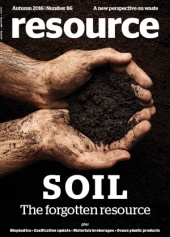Material gains through brokerage services
The market price for recyclables is notoriously prone to fluctuation. If the global economy takes a hit, so does the value of collected materials, and the money earned from them determines whether an operation is viable for recyclers, especially as the cost of collection is not easily changed. It’s under such a shadow that local authorities (LAs) and waste management companies have to operate.
In recent memory, there have been times when price fluctuations have been particularly troublesome. Following the financial crash in 2008, I recall one secondary commodities merchant saying that, because he didn’t know what the right price would be from one day to the next, the only rational thing to do was turn his phone off. At that time, some LAs couldn’t even sell their recycling, and wound up stockpiling it instead, while some waste companies saw a noticeable dent in earnings.
Inevitably, the experience was worse for some than for others. Notably, recycling with little or no contamination could still find a market, which is hardly surprising as quality usually sells. However, this slump highlighted the importance of collectors having a stable market.

While commodity prices are not quite as dire today (though some markets currently have difficulties), the issue is still of primary importance. One comment I hear often at the moment is: ‘What’s the point of recycling more if there aren’t the markets for the material?’ In truth, though, there is always a market for recyclable material – the challenge is finding one that offers the right price.
Along with the product, there are some other obvious features that help make a sale, such as having the contacts and expertise to negotiate the contracts with a reprocessor or merchant. For individual LAs that collect and sell recycling, this diverse set of skills can be asking a lot of one or two people. Currently, LAs typically negotiate material outlet contracts infrequently, often with a number of years between rounds. As such, collective memory and expertise are difficult to maintain.
Meanwhile, sitting on the other side of the table are counterparts in a deal who are specialist purchasing managers for merchants or mills, with a far better understanding of the market. This asymmetry has contributed to the argument that councils should pool resources through a materials brokerage, which enables them to delegate the selling job to a skilled negotiator who deals with contracted consumer counterparts regularly. Furthermore, representing a larger tonnage of saleable material inevitably improves the bargaining position.
There are also features of having to operate commercially that do not fit squarely with how local authorities work, as Steve Read, who is both Head of Service for the Gloucestershire Joint Waste Team and Managing Director of Somerset Waste Partnership, observes: “There are rather strict procedures internally applied for procurement – even though we are sellingmaterial and there is some good WRAP guidance on avoiding making this too complex. LAs are risk-averse bodies and are less good at risk assessing where some procurement processes can be appropriately streamlined
“Another issue we have encountered is receiving income from the people we sell to in a timely manner. As this is determined on the basis of tonnages received by the purchaser, we have to await information from them in order to send them an invoice. While [it’s] not rocket science, there is more than one opportunity for delay in the system.”
It seems clear that there is scope for government to improve the position of LAs selling recycling and contribute to a robust circular economy (more on this later). Certainly, a strategic materials brokerage appears to be an option that may be of a sufficiently win-win nature to find favour. While in the past a small number of authority groups have struck good deals collectively and some private-sector merchant operations function like brokerages, until recently there has been no attempt to resolve some of the problems just mentioned.
In 2014, Zero Waste Scotland started work on a brokerage service with an initial emphasis on glass, but an eye on potentially also brokering dry mixed materials and residual waste. There is, however, still no UK-wide strategic element in brokerage, and both the Welsh and Scottish governments now see this lack of strategy as an omission to be rectified.
Commenting on the decision to move forward with the initiative, Charlie Devine, Head of Resource Management for Zero Waste Scotland, said: “The market for waste materials collected by Scottish local authorities and other public bodies is highly fragmented, meaning that Scotland loses the value of much of its secondary materials. The brokerage service seeks to address these issues by matching up the supply and demand for materials, helping create the right conditions for investment in sorting and onward processing jobs here in Scotland.
“There are benefits for both the public sector, principally in terms of market stability and economies of scale, and the private sector, in terms of assured supply of high-quality materials and potential for inward investment.”
This emphasis on material quality and consistency is a key consideration. The challenge is for different LAs under the umbrella of a brokerage to meet the same requirements, when each has its own collection service profile. As anyone familiar with the issue knows, there are a multitude of factors that contribute to the quality of recyclables resulting from an LA collection service, including the sorting method, technology, operative training and public education.
It’s entirely feasible that a materials marketing service can handle variations in quality, as well as inconsistency from suppliers, as merchants (who are brokers) currently do. However, this will impact on the value obtained, as reprocessors price in the cost of dealing with contamination and the potential that material received could be highly contaminated.
As far as the business case goes, a brokerage must achieve both better value for money and ease of dealings. However, if it is to be of strategic benefit, contributing to the circular economy, then it will also require measures to ensure a reliable product. Crucially, the appetite of producers and manufacturers further along the supply chain is influenced by the quality and consistency of material from reprocessors, so there is an onus to provide a consistent supply to the reprocessor.
“The Scottish Materials Brokerage Service is an important part of delivering Scotland’s ambitions for a more circular economy, which will see valuable products and materials remain in useful circulation for longer, creating and sustaining jobs”, says Devine.
“Importantly, there are particular opportunities for the brokerage service in the context of the drive for greater consistency and improved quality that [the] Scottish Household Recycling Charter – which 20 councils have now signed up to – will deliver.”
Indeed, it appears that support is building across the UK to harmonise the recycling collection services delivered by LAs. In England, WRAP recently put forward three preferred models for councils to consider when looking at a service change. In Wales, the government’s Collections Blueprint, backed by capital investment and expertise, has played a pivotal role in raising municipal recycling rates and improving the quality of recyclable material for sale.
Recently speaking to the Welsh Local Government Association (WLGA), Lesley Griffiths, Cabinet Secretary for Environment and Rural Affairs, reaffirmed the intention of her predecessor to support the development of a brokerage: “I have seen how effectively some local authorities market the materials they collect to maximise income. I know WRAP, through the Collaborative Change Programme, is managing the marketing of materials for several local authorities, and I want to build on this.
“There is work under way looking at a materials brokerage for Wales, including the added value which it might be able to bring, not only in earning income for local authorities, but also interesting reprocessors in the opportunities presented by high tonnages of high-quality materials being offered to market in Wales.
“Welsh Government has been approached by materials reprocessors interested in the possibility of locating new facilities in Wales, provided materials are presented in ways which meet required quality standards. I want to seize this opportunity for new investment and new jobs in Wales as well as seeing Welsh local authorities providing consistently high-quality, higher-value materials to market.”
For a brokerage to play a strategic role, encouraging investment in reprocessing infrastructure closer to where the recycling is collected, sorted and stored, it will need to build confidence among its customers. A quality-oriented brokerage sends clear signals to those considering investment in plant and logistics that the material consistency and a long-term view of the market are already in place.
To demonstrate this requires some transparency. There is a justifiable expectation that Wales, which already has a track record of reporting the end destination for LAs’ recycling, has the stakeholder buy-in required. Audit information not only has the potential to encourage customer confidence, it also can play a role in quantifying the environmental contribution of LAs’ recycling, such as CO2 emissions. By playing a central role in collecting this data, a brokerage can also play a strategic role in ensuring the best outcomes for sustainable development objectives.
“Whilst price is a major consideration to the reprocessor, in my experience, quality and reliability of supply can often carry more weight than a few pounds per tonne. Contaminated feedstock causing damage to [a] plant can make the price difference per tonne seem vanishingly trivial”, notes Andy Moore, Director for UK Recyclate, who has promoted the development of high-quality recycling systems.
“There could be an improvement for material consumers in this arrangement. A brokerage will surely employ people whose whole job is dealing with material movements and deals. These are fellow experts with whom the reprocessor can identify and readily develop mutual understanding and trust through regular contact. So, as with the local authority, time spent negotiating deals or sorting out problems is a cost and sometimes a problem. There appears to be a win-win here in the smoothing of this process via a brokerage. Both the authority and the consumer should save time and trouble.”
 This article was taken from Issue 86
This article was taken from Issue 86It’s view that Steve Read echoes: “To some extent, [a] brokerage might help in that we would potentially contract with just one body under a single contact to sell our material and, secondly, they would hopefully do the data collecting and invoice chasing! There is a risk, however, that another link in the chain would add further delay to the system, although that would probably be outweighed by the avoided cost of doing the chasing.”
This reflects the principal justification of any brokerage: improving the process of transaction, for the benefit of both buyers and sellers. But what makes the current ideas taking root in Wales and Scotland really interesting is the potential for this to play a strategic role in delivering wider economic and environmental benefit.
According to Moore: “Besides its normal commercial activities, a strategic brokerage should foster better vertical integration within the supply chain so that collectors, reprocessors and remanufacturers grasp something of each of the other’s needs and numbers. As far as possible without breaching commercial confidentiality, a strategic brokerage should also be in the business of information sharing and communication with regard to recycling and related issues between stakeholders, contractors, clients and even householders in the form of suitable texts and pictures for instruction leaflets, et cetera. Understanding is aided by transparency of process and motive. Current arrangements are often opaque and an obstacle to building common purpose – surely yet another key driver of the circular economy.” 







